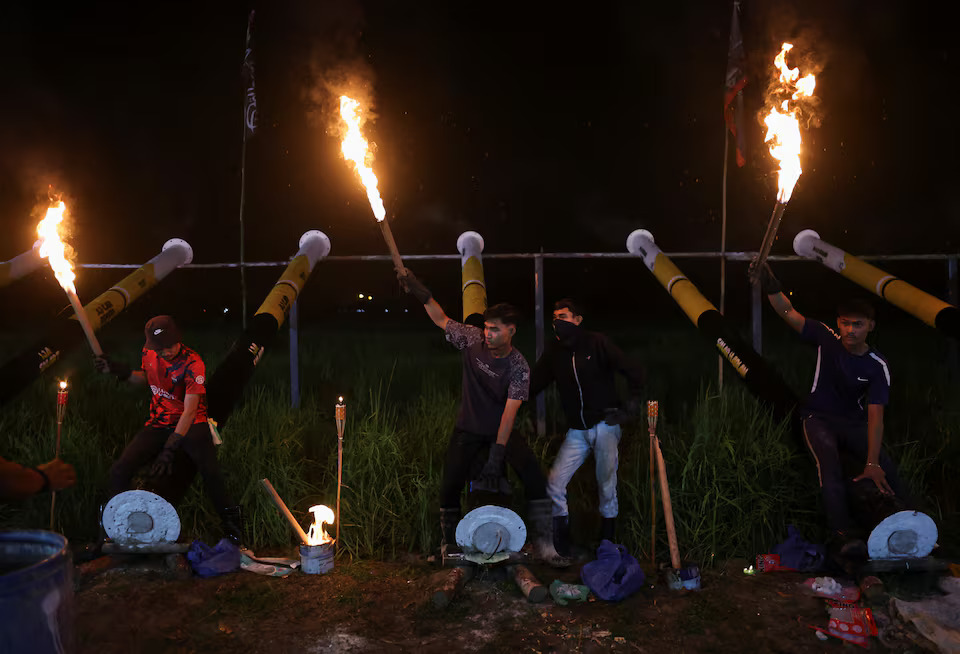KUALA KANGSAR, Malaysia -- As Malaysian Muslims began celebrating Eid al-Fitr after a month of fasting, the sound of cannons echoed through the rice fields of a northern village, in a decades-long tradition heralding the start of the festivities.
Residents of Kampung Talang, 250 km (155 miles) north of the capital Kuala Lumpur, began firing the cannons, known as 'meriam talang' in the Malay language, in 1937.
“For us, Eid doesn’t feel complete without the sound of the cannon... Without it, the village feels empty,” said Amar Ehzan, a 37-year-old villager.
Amar told Reuters the tradition started because the cannons helped scare off wild animals in the surrounding forest and ensure villagers' safety as they celebrated Eid.
Once made from soil and bamboo, the cannons are now built from steel, Amar said, adding that the villagers use up to two metric tons of cobalt to fire more than 80 cannons every year.
"All the younger generation in the village agree and work together to uphold this cannon tradition," Amar said.
"It's a rare event so the excitement to fire the cannon is there."
|
|
| A man reacts as he is about to light a steel cannon as part of a tradition to welcome Eid al-Fitr, on the eve of the celebration in Kuala Kangsar, Malaysia, March 30, 2025. Photo: Reuters |
|
|
| Villagers fire steel cannons as part of a tradition to welcome Eid al-Fitr, on the eve of the celebration in Kuala Kangsar, Malaysia, March 31, 2025. Photo: Reuters |
|
|
| Villagers are silhouetted with fireworks in the background as they wait for their turn to fire steel cannons, a tradition to welcome Eid al-Fitr, on the eve of the celebration in Kuala Kangsar, Malaysia, March 31, 2025. Photo: Reuters |
|
|
| Villagers fire steel cannons as part of a tradition to welcome Eid al-Fitr, on the eve of the celebration in Kuala Kangsar, Malaysia, March 31, 2025. Photo: Reuters |




![[2/5]A man reacts as he is about to light a steel cannon as part of a tradition to welcome Eid al-Fitr, on the eve of the celebration in Kuala Kangsar, Malaysia, on March 30, 2025. Photo: Reuters](https://static.tuoitrenews.vn/ttnew/r/2025/03/31/jyzzg4me5bpp7jxfa2sujlp6di-1743411041.jpg)
![[3/5]Villagers fire steel cannons as part of a tradition to welcome Eid al-Fitr, on the eve of the celebration in Kuala Kangsar, Malaysia, March 31, 2025. Photo: Reuters](https://static.tuoitrenews.vn/ttnew/r/2025/03/31/25wqjchivrkezhyd5ozo4klegy-1743411041.jpg)
![[4/5]Villagers are silhouetted with fireworks in the background as they wait for their turn to fire steel cannons, a tradition to welcome Eid al-Fitr, on the eve of the celebration in Kuala Kangsar, Malaysia, March 31, 2025. Photo: Reuters](https://static.tuoitrenews.vn/ttnew/r/2025/03/31/h4wmnsvntrn67orzpw4kzlsyyq-1743411041.jpg)
![[5/5]Villagers fire steel cannons as part of a tradition to welcome Eid al-Fitr, on the eve of the celebration in Kuala Kangsar, Malaysia, March 31, 2025. Photo: Reuters](https://static.tuoitrenews.vn/ttnew/r/2025/03/31/j6el5wllgvm73fqm6yyz7fyn3a-1743411041.jpg)

















































